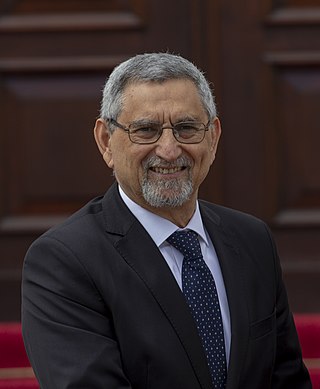
Cape Verde follows a policy of nonalignment and seeks cooperative relations with all friendly states. Angola, Brazil, the People's Republic of China, Cuba, France, Germany, Portugal, Senegal, Russia, South Korea and the United States maintain embassies in Praia.

Mindelo is a port city in the northern part of the island of São Vicente in Cape Verde. Mindelo is also the seat of the parish of Nossa Senhora da Luz, and the municipality of São Vicente. The city is home to 93% of the entire island's population. Mindelo is known for its colourful and animated carnival celebrations, with roots in Portuguese traditions later influenced by the Brazilian culture.

Cape Verde is known internationally for morna, a form of folk music usually sung in the Cape Verdean Creole, accompanied by clarinet, violin, guitar and cavaquinho. Funaná, Coladeira, Batuque and Cabo love are other musical forms.

The African Party of Independence of Cape Verde is a democratic socialist political party in Cape Verde. It was formerly a Marxist–Leninist communist party and the sole legal party in the country from 1981 to 1990. Its members are nicknamed "os tambarinas" in Portuguese, and they identify themselves with the color yellow.

Baltasar Lopes da Silva was a writer, poet and linguist from Cape Verde, who wrote in both Portuguese and Cape Verdean Creole. With Manuel Lopes and Jorge Barbosa, he was the founder of Claridade. In 1947 he published Chiquinho, considered the greatest Cape Verdean novel and O dialecto crioulo de Cabo Verde which describes different dialects of creoles of Cape Verde. He sometimes wrote under the pseudonym Osvaldo Alcântara.

The Democratic and Independent Cape Verdean Union is a conservative political party in Cape Verde.
Manuel António de Sousa Lopes was a Cape Verdean novelist, poet and essayist. With Baltasar Lopes da Silva and Jorge Barbosa he was a founder of the journal Claridade, which contributed to the rise of Cape Verdean literature. Manuel Lopes wrote in Portuguese, using expressions typical for Cape Verdean Portuguese and Cape Verdean Creole. He was one of those responsible for describing world calamities of the droughts that caused several deaths in São Vicente and Santo Antão.
Isabel "Bela" Duarte was a Cape Verdean artist.
Ordem dos Avogados, refers to the bar associations of several Portuguese speaking countries, namely:

Jorge Vera-Cruz Barbosa was a Cape Verdean poet and writer. He collaborated in various reviews and Portuguese and Cape Verdean journals. The publication of his poetry anthology Arquipélago (Archipelago) in 1935 marked the beginning of Cape Verdean poetry. He was, along with Baltazar Lopes da Silva and Manuel Lopes, one of the three founders of the literary journal Claridade ("Clarity") in 1936, which marked the beginning of modern Cape Verdean literature.
José Gabriel Lopes da Silva, also known as Gabriel Mariano, was a Cape Verdean poet, novelist, and an essayist.
Aguinaldo Fonseca was a Cape Verdean poet.
Adriano Gonçalves, known by his stage name Bana and called the "King of Morna", was a Cape Verdean singer and performer of the morna style, the plaintive, melodic lament which is a staple musical style of the country.

Cape Verde or Cabo Verde, officially the Republic of Cabo Verde, is an archipelago and island country of West Africa in the central Atlantic Ocean, consisting of ten volcanic islands with a combined land area of about 4,033 square kilometres (1,557 sq mi). These islands lie between 600 and 850 kilometres west of Cap-Vert, the westernmost point of continental Africa. The Cape Verde islands form part of the Macaronesia ecoregion, along with the Azores, the Canary Islands, Madeira and the Savage Isles.

Jorge Carlos de Almeida Fonseca is a Cape Verdean politician, lawyer and university professor who served as the President of Cape Verde from 2011 to 2021. He served as Minister of Foreign Affairs from 1991 to 1993. Supported by the Movement for Democracy (MpD), he won the 2011 presidential election in a second round of voting. Presidential elections were held in Cape Verde on 2 October 2016, where he was re-elected with 74.08% of the vote.
The following lists events that happened during 2013 in Cape Verde.

The Literature of Cape Verde is among the most important in West Africa. It is the second richest in West Africa after Mali and modern-day Mauritania. It is also the richest in the Lusophone portion of Africa. Most works are written in Portuguese, but there are also works in Capeveredean Creole, French, and notably English.
Maria de Fátima Coronel is a Cape Verdean lawyer and jurist who was President of the Supreme Court of Justice from November 2015 until her retirement in December 2020.
Samira Nandi Marques Vera-Cruz is a Cape Verdean film director, producer, editor and actress.

Presidential elections were held in Cape Verde on 17 October 2021. The result was a victory for José Maria Neves of the opposition African Party for the Independence of Cape Verde (PAICV), who received 51.8% of the vote.










